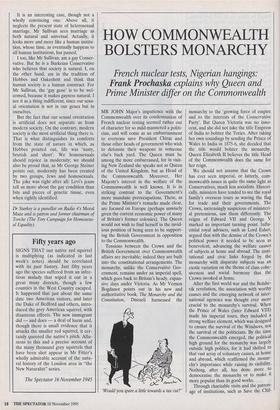HOW COMMONWEALTH BOLSTERS MONARCHY
French nuclear tests, Nigerian hangings:
Frank Prochaska explains why Queen and
Prime Minister differ on the Commonwealth
MR JOHN Major's impatience with the Commonwealth over its condemnation of French nuclear testing seemed rather out of character for so mild-mannered a politi- cian, and will come as an embarrassment to everyone save President Chirac and those other heads of government who wish to detonate their weapons in someone else's back yard. The Queen must be among the more embarrassed, for in visit- ing New Zealand she speaks not as Queen of the United Kingdom, but as Head of the Commonwealth. Moreover, Her Majesty's interest in the welfare of the Commonwealth is well known. It is in striking contrast to the Government's more mundane preoccupations. These, as the Prime Minister's remarks made clear, are focused on Europe (perhaps unwisely given the current economic power of many of Britain's former colonies). The Queen would not wish to find herself in the invid- ious position of being seen to be support- ing the British Government in opposition to the Commonwealth.
Tensions between the Crown and the British Government over Commonwealth affairs are inevitable; indeed they are built into the constitutional arrangements. The monarchy, unlike the Conservative Gov- ernment, remains under an imperial spell, which goes back to Britain's heady, expan- sive days under Victoria. As Mr Vernon Bogdanor points out in his new and authoritative book, The Monarchy and the Constitution, Disraeli harnessed the `Would you spare a little towards a tax cut?' monarchy to the 'growing force of empire and to the interests of the Conservative Party'. But Queen Victoria was no inno- cent, and she did not take the title Empress of India to bolster the Tories. After taking her own soundings by sending the Prince of Wales to India in 1875-6, she decided that the title would bolster the monarchy. Queen Elizabeth II believes the title Head of the Commonwealth does the same for her reign.
We should not assume that the Crown has ever seen imperial, or latterly, com- monwealth issues in quite the same light as Conservatives, much less socialists. Histori- cally, ministers have tended to see the royal family's overseas tours as waving the flag for trade and their governments. The Crown, increasingly suspicious of ministeri- al pretensions, saw them differently. The reigns of Edward VII and George V marked an important turning point. Influ- ential royal advisers, such as Lord Esher, argued that with the demise of the Crown's political power it needed to be seen as benevolent, advancing the welfare causes of subjects at home and abroad. The insti- tutional and civic links forged by the monarchy with disparate subjects was an exotic variation on the theme of class cohe- siveness and social harmony that the Crown invoked at home.
After the first world war and the Bolshe- vik revolution, the association with worthy causes and the emerging network of inter- national agencies was thought ever more crucial to the monarchy's survival. When the Prince of Wales (later Edward VIII) made his imperial tours, they included a strong welfare element, which was designed to ensure the survival of the Windsors, not the survival of the politicians. By the time the Commonwealth emerged, the political high ground for the monarchy was largely outside high politics, for it had shifted to that vast array of voluntary causes, at home and abroad, which reaffirmed the monar- chy's importance while raising its visibility. Nothing, after all, has done more to democratise the monarchy or to make it more popular than its good works.
Through charitable visits and the patron- age of institutions, such as Save the Chil- dren and the World Wide Fund for Nature, the post-war royal family was able to swim with the tide of those post-imperi- al social currents — egalitarianism and internationalism — that helped to disen- gage the crown from the old ruling class in the minds of the public. A monarchy seen associating with starving children and endangered species was in keeping with the post-war mood. The crown's interna- tional welfare role was part of the problem that the Palace had with Mrs Thatcher, whose 'them and us' attitude to the Com- monwealth and apparent want of compas- sion did little to endear her to the more dutiful members of the royal family.
This brings us back to the relationship between the crown and the British Gov- ernment over the French tests in the Pacif- ic. For the monarchy, the cultivation of non-governmental agencies, which come together at Commonwealth conferences, is arguably more significant than the Queen's symbolic importance to the assembled nations. Among the nearly 3,500 institu- tions presently under the patronage of the royal family, hundreds of them are in the Commonwealth, some of them dedicated to the environment or to wildlife. When Prince Philip, at a meeting of the World Wide Fund for Nature in New Zealand, called for a study to be undertaken on the Impact of French testing, he was speaking on behalf of an environmental lobby which he heads. Indeed, it would be surprising if `his' institutions had not invited him to make a more robust declaration against nuclear testing in the Pacific.
Prince Philip's comments were sugges- tive of the monarchy's sensitivity to Com- monwealth causes. They were indicative of the crown's particular perspective on Com- monwealth affairs, which can lead to ten- sions between the Palace and Number 10. For their part, the Conservatives seem unlikely to take much notice of the results of any investigation into French testing, even one supported by Prince Philip. British politicians, it must be said, have the courage to bear the misfortunes of former colonies. Further, has the Prime Minister `moral spoken of the Commonwealth's moral authority' or its role as a 'significant force for good in a troubled world' as the Queen did in her summit banquet speech? Perhaps not surprisingly, the single most Compelling issue confronting the Com- monwealth leaders, the fate of Ken Saro- Wiwa and his fellow activists, ended in tragedy. The Queen's role in the campaign to secure their release is difficult to judge. Be that as it may, the Palace and the British Government will take what comfort they can from the conference, but it is not the same comfort. Given the events of the last two weeks, there has been precious lit- tle of it to go around.
The author's book, Royal Bounty: The Making of Welfare Monarchy, Yale Uni- verstiy Press, has just been published.



















































































 Previous page
Previous page